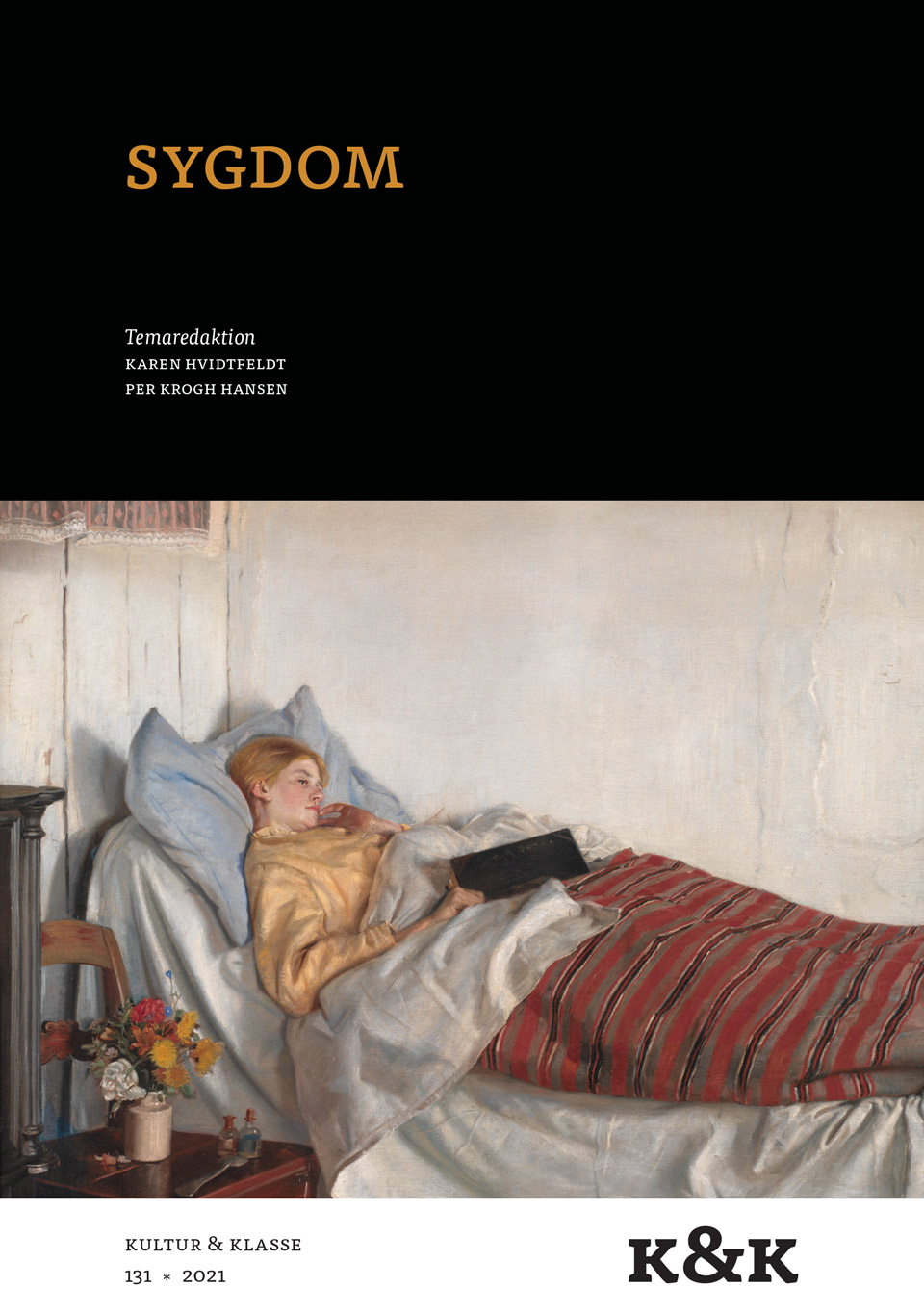Den uhelbredeligt hjemløse kinesiske dagbogsfiktion
Om Lu Xuns og Ding Lings sygdomsramte dagbogsskrivere
DOI:
https://doi.org/10.7146/kok.v49i131.127676Nøgleord:
Lu Xun, Ding Ling, sygdom, helbred, kropsforestillinger, hjemmet, medicinsk humanioraResumé
This article examines the disease motif in Lu Xun’s “Diary of a Madman” (1918) and in Ding Ling’s “Miss Sophia’s Diary” (1928) in their historical and medical contexts. At its most fundamental, the contemporaneous Chinese conception of health was thermodynamic, vesting the utmost importance in the circulation of energies and substances. This conception had immense social importance because it provided part of the ideological scaffolding for the family structure. Inside the family, established responsibilities and hierarchies purportedly served to guide this circulation in ways supportive of health, and the same considerations charged family members with maintaining strict scrutiny of the family’s barriers against any potentially illness-inducing influences that might penetrate the family fortress. Written at a time when political, social, and scientific verities were crumbling in China, these diaries record the foibles and concerns of two diseased individuals who stand alienated from their families and their immediate surroundings. By focusing on this alienation, as well as on the shared interests of the diarists in boundary crossing flows and anthropophagy, this article suggests that these short stories can profitably be read as explorations of the anxieties facing this generation of young Chinese as they sought to make a world for themselves independently of their families. What these stories dramatize is that leaving the family behind might have medical ramifications in addition to social and financial costs. In the current covid-19 context, we may not need reminding that ideas about disease and health relate in important ways to how we think of the relationship between families, boundaries, and vulnerability.
Referencer
Brandes, George. Samlede Skrifter. København: Gyldendal, 1899, vol 10.
Bray, David. Social Space and Governance in Urban China: The Danwei System from Origins to Reform. Californien: Stanford University Press, 2005.
Bruun, Ole. Fengshui in China: Geomantic Divination between State Orthodoxy and Popular Religion. University of Hawai’i Press, 2003.
Chen, Xiao-Ping og Shu Li. ”Cross-National Differences in Cooperative Decision-Making in Mixed-Motive Business Contexts: The Mediating Effect of Vertical and Horizontal Individualism.” Journal of International Business Studies 36 6 (2005): 622–36.
Clark, Paul. ”Model Theatrical Works and the Remodelling of the Cultural Revolution.” Art in Turmoil: The Chinese Cultural Revolution, 1966-76. Red. Richard King et al. Vancouver: UBC Press, 2010. 167–87.
Davies, Gloria. Lu Xun’s Revolution. New York: Harvard University Press, 2013.
Denton, Kirk A. Exhibiting the Past: Historical Memory and the Politics of Museums in Postsocialist China. University of Hawaiʻi Press, 2014.
Diamant, Neil J. ”Re-Examining the Impact of the 1950 Marriage Law: State Improvisation, Local Initiative and Rural Family Change.” The China Quarterly 161 (2000): 171–98.
Ding, Ling. ”Frøken Sofies Dagbog (莎菲女士的日記).” Xiaoshuo Yuebao 19 2 (1928): 202–23.
Ding, Ling, og Hatla Thelle. Ding Ling. Noveller & biografi. København: Tiderne Skifter, 1987.
Edwards, Louise. ”Women Sex-Spies: Chastity, National Dignity, Legitimate Government and Ding Ling’s ‘When I Was in Xia Village.’” The China Quarterly 212 (2012): 1059–78.
Feuerwerker, Yi-Tsi Mei. ”In Quest of the Writer Ding Ling.” Feminist Studies 10 1 (1984): 65–83.
Fiss, Geraldine. ”Ding Ling’s Feminist Writings: New Women in Crisis of Subjectivity.” Routledge Handbook of Modern Chinese Literature. Red. Mingdong Gu. New York: Routledge, 2019. 343–55.
Guo, Ying. ”Lu Xun: En udforskning af pseudonymer (鲁迅: 笔名探析).” Neimenggu Linye, 5 (2013): 35.
Ha, Jin. The Banished Immortal: A Life of Li Bai. New York: Vintage Books, 2019.
Kuriyama, Shigehisa. The Expressiveness of the Body and the Divergence of Greek and Chinese Medicine. New Jersey: Zone Books, 2002.
Kuriyama, Shigehisa. ”The Imagination of Winds and the Development of the Chinese Conception of the Body.” Body, Subject, and Power in China. Red. Angela Zito og Tani E. Barlow. Chicago: University of Chicago Press, 1994. 23–42.
Lee, Haiyan. The Stranger and the Chinese Moral Imagination. Californien: Stanford University Press, 2014.
Lee, Leo Ou-Fan. ”In Search of Modernity: Some Reflections on a New Mode of Consciousness in Twentieth-Century Chinese History and Literature.” Ideas Across Cultures. Red. Paul A. Cohen og Merle Goldman. New York: Harvard University Asia Center, 1990. 109–36.
Lei, Sean Hsiang-lin. ”Habituating Individuality: The Framing of Tuberculosis and Its Material Solutions in Republican China.” Bulletin of the History of Medicine 84 2 (2010): 248–79.
Lu, Tina. Accidental Incest, Filial Cannibalism, and Other Peculiar Encounters in Late Imperial Chinese Literature. New York: Harvard University Press, 2008.
Lu Xun. Opråb. København: Sand & Jern, 2018.
Markus, Hazel R., og Shinobu Kitayama. ”Culture and the Self: Implications for Cognition, Emotion, and Motivation.” Psychological Review 98 2 (1991): 224–53.
Pollard, David E. The True Story of Lu Xun. Hong Kong: Chinese University Press, 2002.
Shapiro, Hugh. ”The Puzzle of Spermatorrhea in Republican China.” Positions 6 3 (1998): 551–95.
Sivin, Nathan. Health Care in Eleventh-Century China. New York: Springer International Publishing, 2015.
Sørensen, Bo Ærenlund. ”Porous Personhood in Contemporary Chinese Culture: A Dialogue with Cross-Cultural Psychology.” Human Arenas 3 3 (2020): 331–42.
Steinhardt, Nancy Shatzman. Chinese Architecture: A History. New York: Princeton University Press, 2019.
Tang, Xiaobing. ”Lu Xun’s ‘Diary of a Madman’ and a Chinese Modernism.” PMLA 107 5 (1992): 1222–34.
Tang, Xiaobing. Chinese Modern: The Heroic and the Quotidian. Durham: Duke University Press, 2000.
Unschuld, Paul U. Traditional Chinese Medicine: Heritage and Adaptation. New York: Columbia University Press, 2018.
Windscript, Shan. ”How to Write a Diary in Mao’s New China: Guidebooks in the Crafting of Socialist Subjectivities.” Modern China (2020): 1-29.
Wong, Ka F. ”Modernity, Sexuality, and Colonial Fantasy in Ding Ling’s ‘Miss Sophia’s Diary’” (1928).” Studies on Asia 4 2 (2014): 115-144.
Yamagishi, Toshio. ”Cross-Societal Experimentation on Trust: A Comparison of the United States and Japan.” Trust and Reciprocity: Interdisciplinary Lessons from Experimental Research. Red. James Walker og Elinor Ostrom. New York: Russell Sage Foundation, 2003. 352–70.
Zhang, Huiwen. ”Lu Xun Contra Georg Brandes. Resisting the Temptation of World Literature.” EU-Topias 14 (2017): 135–45.
Downloads
Publiceret
Citation/Eksport
Nummer
Sektion
Licens
Tidsskriftet følger dansk ophavsret.





